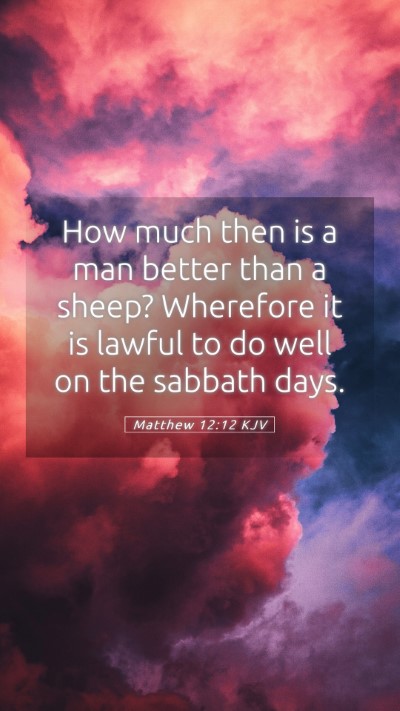Understanding Matthew 12:12
The verse Matthew 12:12 states: "How much then is a man better than a sheep? Wherefore it is lawful to do well on the sabbath days." This verse takes place during a dispute between Jesus and the Pharisees regarding the appropriateness of performing good deeds on the Sabbath. Here, we explore the meaning of this Bible verse through various public domain commentaries, providing insights on its interpretation and significance.
Bible Verse Context
Matthew 12:12 is located in a passage where Jesus emphasizes mercy over sacrifice, and highlights the importance of doing good. This discussion is critical in understanding Jesus' approach to the law and its application in daily life.
Insights from Matthew Henry
Matthew Henry suggests that this verse reflects not only the compassion of God but also serves as a rebuke to the rigid legalism of the Pharisees. He emphasizes that humans have a higher value in God's eyes compared to animals, which indicates that acts of mercy and kindness are permissible and encouraged, especially on the Sabbath.
Albert Barnes’ Commentary
Albert Barnes notes that Jesus is taking a stance against the Jewish leaders who prioritized tradition over compassion. He argues that if it is lawful to care for a sheep on the Sabbath, it is even more acceptable to assist a person in need. Barnes highlights the principle that love and benevolence should take precedence over ceremonial law.
Adam Clarke’s Exegesis
Adam Clarke provides a detailed analysis, emphasizing the humanitarian aspect of the law. He argues that the Sabbath was created for man, not man for the Sabbath, thus underscoring that the spirit of the law is rooted in love and mercy. Clarke affirms that Jesus' teaching advocates for the responsible use of the Sabbath to promote welfare and well-being.
Key Themes in Matthew 12:12
- The Value of Human Life: This verse illustrates the intrinsic value of human life over animals, affirming that care for people is paramount.
- Compassion on the Sabbath: Jesus teaches that doing good does not violate the Sabbath rest but rather fulfills its true purpose.
- Critique of Legalism: The verse serves as a critique of the legalistic interpretation of the law espoused by the Pharisees, promoting a more compassionate approach.
Applications for Today
Understanding Matthew 12:12 offers several applications for modern believers:
- Emphasizing Compassion: Followers of Jesus are called to prioritize compassion in their daily interactions, especially when laws or traditions may say otherwise.
- Balance between Law and Love: This verse encourages a balanced understanding of God's commandments, advocating for love to be the guiding principle of actions.
- Reflection on Personal Practices: Believers are encouraged to reflect on their practices, ensuring that they align with the spirit of generosity and kindness.
Related Bible Cross References
- Mark 2:27 - Jesus states, "The Sabbath was made for man, and not man for the Sabbath."
- Luke 14:5 - Jesus challenges the Pharisees, asking if they would not assist an ox on the Sabbath.
- Matthew 7:12 - The Golden Rule, "Therefore all things whatsoever ye would that men should do to you, do ye even so to them."
Conclusion
Matthew 12:12 invites believers to examine the underlying principles of their faith and encourages an interpretation of scripture that emphasizes love, mercy, and the inherent value of human life. This understanding of Scripture not only enriches personal faith journeys but also informs how we engage with others in our communities.
Further Study Resources
For those interested in further exploring the implications of Matthew 12:12 and similar scriptures, consider joining Bible study groups, utilizing online Bible study resources, or exploring detailed Bible commentary tools and Bible study guides.


